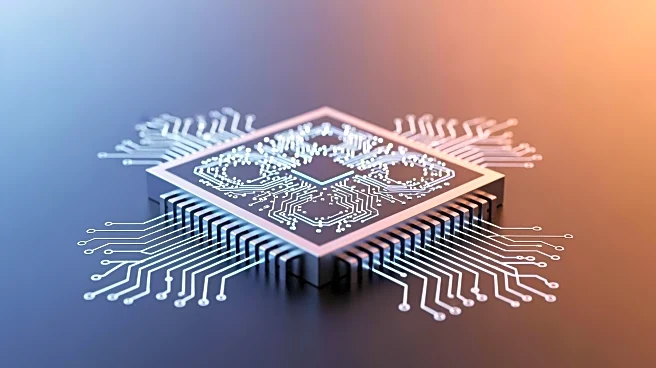What's Happening?
The Trump administration is contemplating a policy shift that would permit Nvidia to sell its H200 artificial intelligence chips to China. This potential change comes as part of a broader easing of trade tensions between the U.S. and China, following a recent agreement between President Trump and Chinese leader Xi Jinping. The Commerce Department is currently reviewing the export controls that have previously restricted the sale of advanced AI chips to China. Nvidia has expressed concerns that current regulations prevent it from competing effectively in the Chinese market, which is rapidly expanding and dominated by foreign competitors. The H200 chip, which boasts higher bandwidth memory than its predecessor, the H100, is considered twice as powerful
as the H20 chip, the most advanced AI semiconductor currently allowed for export to China.
Why It's Important?
The potential policy shift could have significant implications for U.S.-China relations and the global technology market. Allowing Nvidia to sell advanced AI chips to China could enhance the competitiveness of U.S. technology firms in the Chinese market, which is crucial for their growth. However, this move is met with concern from China hawks in Washington, who fear that such exports could bolster China's military capabilities. The decision reflects a delicate balance between fostering economic ties and addressing national security concerns. The outcome of this review could influence future trade policies and the strategic positioning of U.S. technology companies in international markets.
What's Next?
If the policy change is approved, it could lead to increased sales and market presence for Nvidia in China, potentially setting a precedent for other U.S. technology firms seeking access to the Chinese market. The decision may also prompt reactions from political leaders and industry stakeholders, who will weigh the economic benefits against national security risks. The Commerce Department's review process and subsequent decision will be closely monitored by both domestic and international observers, as it could signal a shift in U.S. trade policy towards China.
Beyond the Headlines
The decision to allow Nvidia to sell H200 chips to China could have broader implications for the global semiconductor industry. It may influence the competitive dynamics between U.S. and Chinese tech firms, potentially leading to increased collaboration or competition. Additionally, this development could impact the strategic alliances and supply chain dependencies within the technology sector, as companies navigate the complexities of international trade and regulatory environments.


















